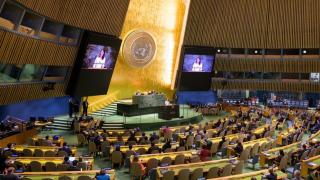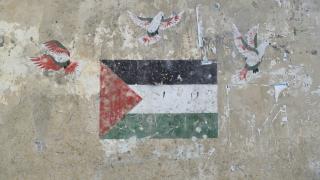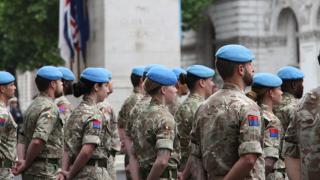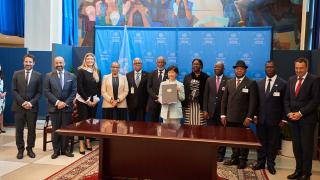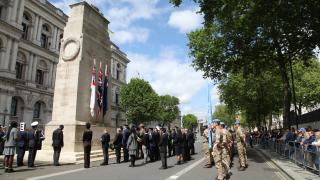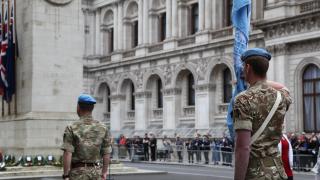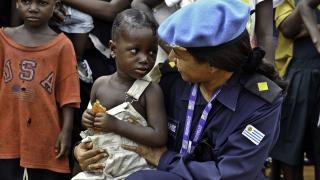
Part of our regular series of background briefings on the UN in the news.
Peacekeeping is in the news. President Trump wishes to cut funding to the UN for peacekeeping. Tough negotiations reduced the UN presence in Haiti, and, by a smaller amount, in the Democratic Republic of Congo. Allegations of sexual abuse persist. Against this backdrop on wednesday UNA-UK will join with UNA-Westminster and the Royal United Services Institute (RUSI) for a day long conference and Europe's largest ceremony commemorating peacekeepers. What is it all about?
What is peacekeeping?
Peacekeeping is an intervention into an area of instability in order to facilitate the transition of that area back towards peace. Peacekeepers can be civilians and are frequently police officers, but the majority of peacekeepers are armed military personnel.
Peacekeeping is not only performed by the UN. The African Union (AU) has several active peacekeeping missions, in addition to joint missions with the UN. The EU, NATO, member states such as France, and ad-hoc coalitions such as the 'Multinational Force' in the Sinai have also conducted peacekeeping missions of one form or another.
What can UN peacekeepers do?
The role of UN peacekeepers is to enforce a mandate given to them by the UN Security Council. Peacekeepers can therefore do as much or as little as the Security Council resolution allows them.
These resolutions are adapting with the times. The traditional role of a peacekeeper was to observe the ceasefire line in a frozen conflict, and in a minority of missions (Cyprus and South Lebanon) that is still the case, but most missions are now more complicated than this. An emergent norm from subsequent generations of peacekeeping missions was that the role of a peacekeeper was to extend the legitimate authority of the state. But in some of the increasingly fragmented and fragile conflicts where peacekeepers currently operate, the state cannot be thought of as a singular entity, and its legitimacy is not beyond question. Nowadays the role of the peacekeeper is often to protect civilians, including by the use of force, in situations where there is limited peace to keep.
This requires a new kind of mandate. Traditionally peacekeeping has relied upon three principles:
- Consent of the parties to the conflict
- Impartiality
- Non-use of force except in self-defence and defence of the mandate
However, these principles now have to be interpreted creatively. Increasingly peacekeepers are given mandates which allow them to to robustly protect civilians, even if this means using force to prevent the loss of civilian life. However, it is still clear that peacekeepers are not peace enforcers, and that when there is truly no peace to keep the efficacy of peacekeeping missions is far more limited.
Current operations
Currently the UN deploys just over 113,000 peacekeepers: 82,700 armed troops, just under 12,000 police, nearly 2,000 military observers, 5,000 international civilian personell, around 10,000 local staff and 1,500 volunteers. Around 4,000 peacekeepers are women.
124 different countries contribute these personnel. They are reimbursed for doing so, and are supported by the UN Department for Peacekeeping Operations, however, the contributing country retains responsibilty for uniformed personnel's conduct, and can ultimately determine where they are sent and what tasks they perform. Ethiopia, India, Pakistan, Bangladesh and Rwanda are the primary troop contributors.
How much does it cost and who pays?
Peacekeeping costs around $7.9 billion a year. To put that number into context, this represents less than 0.5% of global military spending. The cost to the UK is around $450 million, around £5.30 - the cost of a pricey pint - per person per year.
UN peacekeeping represents very good value for money. The cost of deploying a UN troop is over 80 times less, than that of deploying - for example - an American troop to perform the same task.
The cost of peacekeeping is shared between member states according to a special formula. The amount that states contribute to the UN budget (itself the result of a seperate formula based upon ability to pay) is taken as a starting point. Then less wealthy nations are given progressively larger discounts based upon their relative wealth. These discounts are paid for by charging a premium to permanent members of the UN Security Council (the UK, US, China, Russia and France) in recognition of the greater responsibilities that come with their greater degree of control over peackeeping.
Does it work?
Yes.
Recent positive examples of peacekeeping include Liberia and Sierra Leone, while the situation in Mali, the Central African Republic and the Democratic Republic of Congo is considerably improved as a consequence of the UN's intervention.
Several academic studies have determined that the presence of peacekeepers significantly reduces the risk of renewed warfare, and that the more peacekeeping troops and police deployed, the fewer the civilian deaths. A study by the Rand Corporation concluded that:
"the UN success rate among missions studied (seven out of eight societies left peaceful, six out of eight left democratic) substantiates the view that... the UN provides the most suitable institutional framework for nation-building missions that require fewer than 20,000 men; one with a comparatively low cost structure, a comparatively high success rate, and the greatest degree of international legitimacy"

